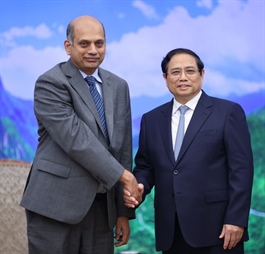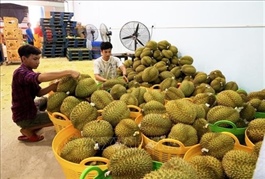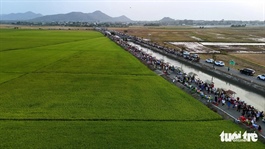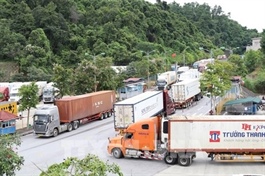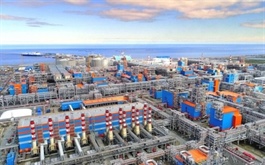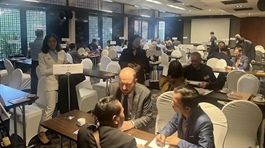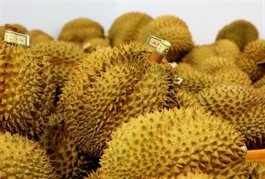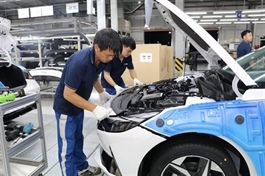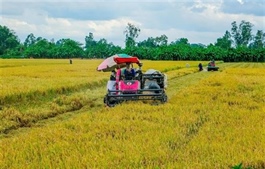Hanoi boosts sustainable aquaculture with high-tech farming
Hanoi boosts sustainable aquaculture with high-tech farming
The average fish farm productivity in Hanoi is about five tons per hectare. This can reach 10 to 12 tons in modern aquaculture.
Hi-tech aquatic farming has proved to be an efficient model that gives a boost to Hanoi's aquaculture sector in recent years.
According to local authorities, Hanoi has invested heavily in the modern aquaculture sector, converting some 24,000 hectares of the city's total 31 hectares of water into advanced fish farms.
The average aquatic productivity in Hanoi is about five tonnes of product per hectare. It reaches 10-12 tonnes in modern fish farms.
The city's aquaculture sector has also seen its overall aquatic production increase over the years, growing by 2.5-3.5% annually.
High-tech aquaculture projects have been replicated throughout the city. In Phu Xuyen District, Tri Trung Commune has reserved an area of nearly 123 hectares to develop hi-tech aquaculture farms in 2021-2030.
In Ung Hoa District, the local government has considered a project to apply high-tech solutions to develop a sustainable and efficient domestic aquaculture sector by 2025, with a vision to 2030.
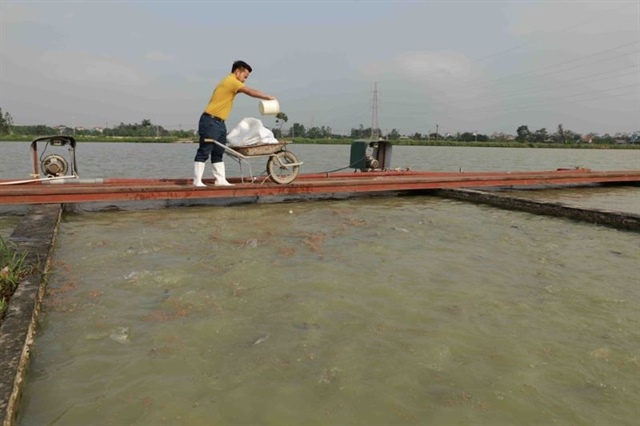
A high-tech aquaculture farm in Dai Ang commune, Thanh Tri district. Photo: The Hanoi Times |
In 2018, the authorities of Dai Ang commune in Hanoi's Thanh Tri District encouraged local households to lease their land to the Dai Ang Hi-Tech Fisheries Cooperative.
On a consolidated area of 10 hectares, the cooperative has developed an aquatic farm using river-in-pond technology, where water flows in and out constantly, creating an environment that feeds and nurtures a wide range of aquatic species throughout the year.
This allows the producer to maximize productivity with high density in the water and achieve sustainable aquaculture.
After five years of using the technology, the farm produced 1.8 times as much as traditional farming. "We sell about 250 tonnes of various aquatic products every year," said Cao Dinh Thanh Hai, director of the cooperative.
He said the cooperative complies with Vietnamese Good Agricultural Practices (VietGAP) and is certified by the Hanoi Department of Agriculture and Rural Development.
"The products are of high quality and safety as they are regularly sampled and tested every year," Hai said.
Almost 10 years ago, Doan Ngoc Khuyen in Cam Linh Commune, Ba Vi District, harvested just 10-15 tonnes of fish from his 3.5-hectare farm using the old-fashioned method.
After adopting high-tech organic aquaculture and investing heavily in machinery for better ventilation, automatic feeding and water purification, Khuyen's fish production has increased to 25-30 tonnes per year, bringing him an annual income of VND1 billion (more than US$40,400).
The Dai Ang Hi-Tech Fisheries Cooperative and Khuyen's farm are two of 54 hi-tech aquaculture facilities in Hanoi that have used modern technology to not only increase productivity, but also make their produce safer for consumers.
According to Nguyen Dinh Dang, Director of the Hanoi Department of Animal Husbandry, Fisheries and Veterinary Medicine, the use of new technologies and modern production methods has given a great boost to the domestic aquaculture sector.
He said there were now more than 9,700 hectares of modern aquaculture farms in Hanoi, using biological products, water fans and automatic fish feeders.
"The whole city now has 60 river-in-pond model tanks with flow and aeration systems that breed fish at high densities," he said.
"These farms have achieved higher productivity and produced higher quality aquatic products, thus increasing their income."
Ta Van Tuong, deputy director of the Hanoi Department of Agriculture and Rural Development, said the capital will further boost the development of high-tech and organic aquaculture in 2022-2025.
According to Resolution 08/NQ-HDND issued by the Hanoi People's Council in July 2023, Hanoi authorities will provide funding for high-tech aquaculture farms so that local producers can proceed with their projects and solve environmental problems, the deputy director said.
"We recommend that the district and commune authorities disseminate the resolution and policy on aquaculture extension among fish farm owners so they can access the necessary resources," he said.
"It is also recommended that sub-municipal authorities continue to develop new production plans based on their comparative advantages and allocate budgets to develop organic aquaculture, creating a wide range of fresh and safe food and enhancing Hanoi's aquatic brands."







